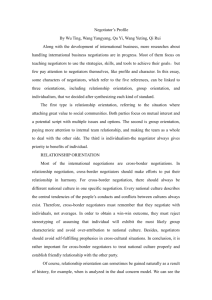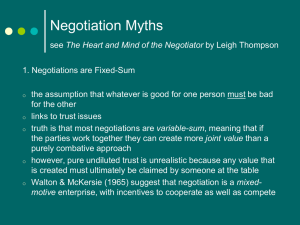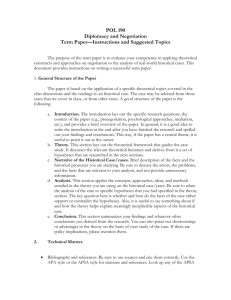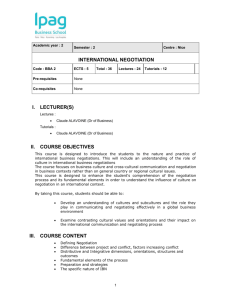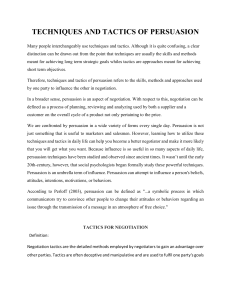Chapter 10 - Influence and Negotiation
advertisement
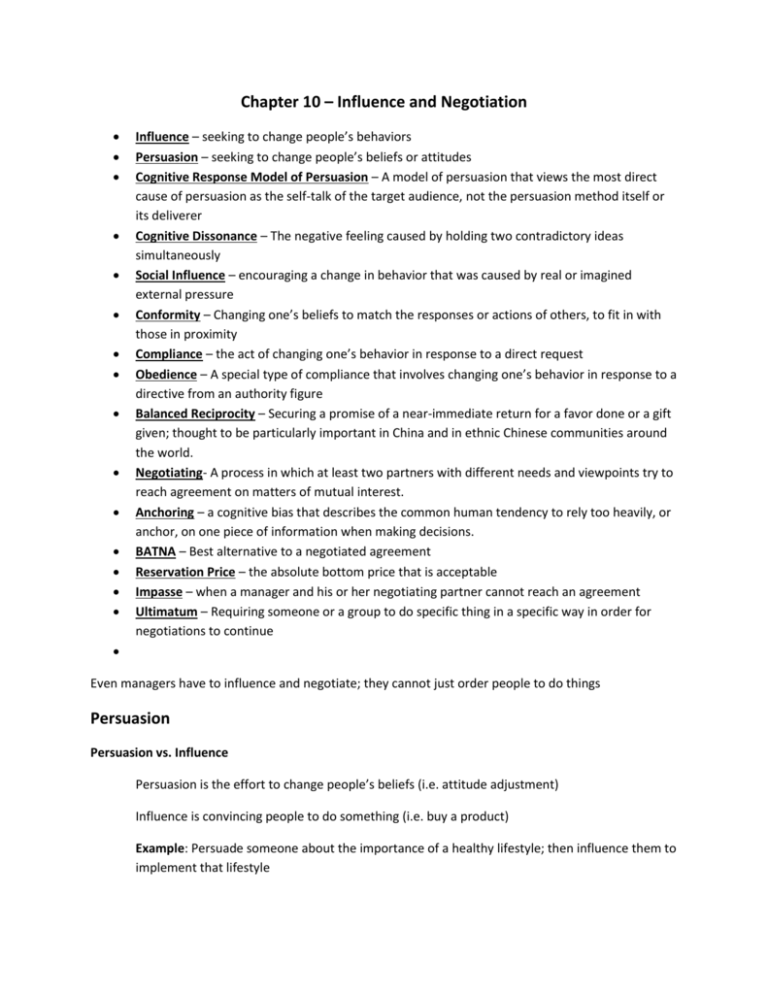
Chapter 10 – Influence and Negotiation Influence – seeking to change people’s behaviors Persuasion – seeking to change people’s beliefs or attitudes Cognitive Response Model of Persuasion – A model of persuasion that views the most direct cause of persuasion as the self-talk of the target audience, not the persuasion method itself or its deliverer Cognitive Dissonance – The negative feeling caused by holding two contradictory ideas simultaneously Social Influence – encouraging a change in behavior that was caused by real or imagined external pressure Conformity – Changing one’s beliefs to match the responses or actions of others, to fit in with those in proximity Compliance – the act of changing one’s behavior in response to a direct request Obedience – A special type of compliance that involves changing one’s behavior in response to a directive from an authority figure Balanced Reciprocity – Securing a promise of a near-immediate return for a favor done or a gift given; thought to be particularly important in China and in ethnic Chinese communities around the world. Negotiating- A process in which at least two partners with different needs and viewpoints try to reach agreement on matters of mutual interest. Anchoring – a cognitive bias that describes the common human tendency to rely too heavily, or anchor, on one piece of information when making decisions. BATNA – Best alternative to a negotiated agreement Reservation Price – the absolute bottom price that is acceptable Impasse – when a manager and his or her negotiating partner cannot reach an agreement Ultimatum – Requiring someone or a group to do specific thing in a specific way in order for negotiations to continue Even managers have to influence and negotiate; they cannot just order people to do things Persuasion Persuasion vs. Influence Persuasion is the effort to change people’s beliefs (i.e. attitude adjustment) Influence is convincing people to do something (i.e. buy a product) Example: Persuade someone about the importance of a healthy lifestyle; then influence them to implement that lifestyle Today, more focused on understanding what encourages people to change their beliefs To persuade, need to show how you are solving that person’s problems 3 Reasons why people respond to a persuasive message: 1. Many people would like to build a more accurate view of the world 2. People like to be consistent with their own values 3. People care about what others think Influence A group or opinion leader increases your desire to conform by showing that everyone else is doing things a particular way (i.e. dress) 6 Universal Principles of Influence 1. Social Proof – states people are more likely to want to do something if they believe that many others are doing the same thing or buying the same product a. Opinion leaders very influential b. May even go along even if think incorrect 2. Authority – states people are more likely to say yes to a request or purchase a product if an authority says it is good to do so a. China –if high-ranking gov’t official visits, pictures are taken with him and hung near the entrance to show some kind of official support 3. Liking – people are more likely to be influenced by those whom they like or with whom they have similarities a. People who share social values and political beliefs are more likely to listen to each other b. Informal conversations create ideal opportunities to discover common areas of enjoyment c. Establishing connections presents a presumption of similarity d. Praise can also establish liking , criticism has the opposite effect e. Different cultures have different reactions to praise or criticism (i.e. Thailand would take criticism very hard so be sure to praise them first.) 4. Consistency – indicate show people are influenced by showing how their previous statements or stated values fit with a recommendation or request a. People prefer to be consistent with statements that they have made public b. Its is not your commitment that will influence people, it is their commitment... you are reminding them of that commitment 5. Reciprocation – states that people are more likely to say yes to a request when the requester has done something for that person in the past a. Mailing out a request for donations gets an 18% success rate, but adding a small gift nearly doubles the donation rate to 35% b. In many countries, gift giving is legal and is part of the business culture c. International managers need to understand reciprocity and be able to respond properly to those who feel that they have provided something that results in a debt to be repaid 6. Scarcity – argues that people are more likely to buy a product or want to do something that they perceive as scarce, unique, or dwindling in availability a. Reactance – if we are told we cannot have or do something, then we want it more b. Do not let scarcity and fear of mistake create too much risk aversion that your organization will fail to try anything new or different. Negotiations Decisions can be affected by: availability (vivid examples and stories, particularly emotional ones), loss aversion (not wanting to walk away from a deal that took months to arrange), consistency, etc. Starting with a high price in a negotiation works in some countries (China and Middle East) but not in others (Northern Europe) Power – Typically, larger companies have more leverage over price than a smaller company. However, need to be careful because small company could have backing of gov’t (developing countries) or have several other options. Distributive Negotiations – Concept of dividing up a fixed pie. If one person gains, the other party loses. This is often the case when the negotiation involves only one issue. Integrative Negotiations – Have the potential to expand the size of resources available for the negotiators to divide. It must involve more than one item. Two ways to accomplish: 1 – expand the items of interest in a negotiation and make the deal bigger 2 – try to identify and incorporate issues that the two sides value differently to create additional room for trade-offs and needed concessions This method can create more value for everyone Unrealistic expectations can hurt a team, whether they are over or under-confident People tend to focus on an anchor, even though it has very little applicability to the current situation or is pushing in an unwanted direction. Those bidding first can use anchors to their favor by setting the numbers and topics around which the negotiations will focus. Negotiators need to fight the instinct to escalate commitment due to the commitment of time and energy. Chinese negotiators are known for recognizing this and delaying negotiations until the counterpart is about to leave. Don’t be afraid to walk away when you know what your BATNA is as well as your counterpart’s BATNA and reservation price. Having well-organized and relevant information is crucial to effective negotiations. Most negotiators will not offer the information up front. You should never reveal your reservation price. Most people make decisions based on vivid experiences and events. Individuals are often as impressed by the theatricality of a presentation as its substance. Target Price – emphasize your target price and negotiate other terms. If one side asks for concessions, reciprocate back right away because they will be more likely to make concessions as well Framing – this is essential to negotiation. Instead of focusing on risks in a negotiation, you might want to focus on opportunities. People are more influenced by avoiding a loss than by equivalent gains Often, people walk away from negotiations even if the agreement is economically rational if they feel they have been unfairly treated or deceived in some way Ways to restart stalled negotiations 1. Try to focus on underlying interests or values rather than only on positions 2. Make an initial small concession, then suggest one in return 3. It may be helpful to bring in a third party for a fresh perspective Positive moods help with negotiation When dealing with Chinese or Russians, expect to make small concessions so they feel they have done a good job negotiating




